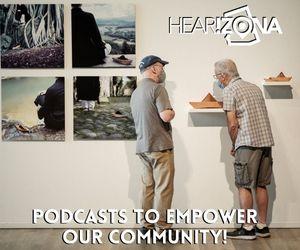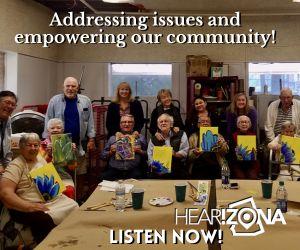
Husband-and-wife pianists Vladimir Pleshakov and Elena Winther are renowned for their interpetations of the great Russian masterpieces. Friday, April 26 at the Musical Instrument Museum, the duo celebrated the 140th anniversary of Rachmaninoff's birth with a concert that included Rachmaninoff's first and last works for 2 pianos.
K-Bach's Janine Miller chatted with Vladimir Pleshakov about the concert and his illustrious career.
1) How did you and your wife, Elena, meet? What are some of the joys...and challenges...of performing with the person you're married to?
Elena was the first person I met in San Francisco on the day after I arrived to relocate to the US from Australia, We dated for a few weeks, then went our separate ways. Our paths crossed again 27 years later. This time we stayed together and married. Being fellow musicians is fine, but being fellow pianists does pose some dangers. We have solved that problem in having each of us develop a repertoire which is one's "exclusive domain". In her concerts and recordings, Elena plays certain works of Mozart, Beethoven, Chopin, Debussy, and Field that I never play in public. Likewise, I have my own concert-stage "territory". In this way, we can even share solo concerts, each of us two being responsible for one half of the program. We complement each other, we do not compete. But when we give two-piano recitals, we become a team, and our personalities change and blend.
2) You have lived in some interesting places (including Shanghai and Sydney). What's the most interesting venue at which you've performed, and why?
The most interesting venue for us was the Philharmonia Hall (Shostakovich Hall) in St.Petersburg, Russia. As "Dvoryanskoye Sobrayie" (Nobiliity Hall, as it was called in the 19th-century), it was visited by luminaries such as Liszt, Berlioz, Tchaikovsky, Rachmaninoff, and other composers and performers of international fame.
We performed there several years in a row as soloists and with orchestra in piano concertos. I warmed up in the wings on Tchaikovsky's historical personal piano.
In the US, I remember most warmly having to perform as solo pianist in the Kennedy Center in Washington, DC, and in Avery Fisher Hall. Most memorable of all was Stern Auditorium, Carnegie Hall, where I wore three hats. Besides my role as solo pianist and two-piano partner with my wife, I also had my debut as composer. I own a tiny bit of history in that sphere, with Tchaikovsky inaugurating the Hallat at its opening and starting a long line of illustrious world premieres there. Some fourteen of my works had their world premiere there.
As far as where I had lived: Shanghai (China), Sydney and Melbourne (Australia), Kobe (Japan), San Francisco and Palo Alto (California), New York State, Provence (France). We have concertized in 27 countries.
3) Sergei Rachmaninoff must be an important composer to you and Elena, since you are commemorating his April birthdate with the upcoming concert at the MIM...then taking the concert on tour. What is so special to you about Rachmaninoff?
At age 6 I heard on a radio broadcast (in Shanghai, China, where I was born) Rachmaninoff's own recording of a Chopin waltz. I was instantly transfixed by the myriad of details in his playing, details concealed beneath an unruffled surface, with his playhing exhibiting enormous intensity and logic and flow and simplicity. This one hearing started me on my studies in music - at age six!
My three teachers were all devotees of Rachmaninoff. Two of them met him personally, and one was coached by him in Russia in performing the 2nd and 3rd piano concertos. In Sydney, the symphony conductor Eugene Goossens related to me his experiences in conducting for Rachmaninoff in concerts in the US. I met and talked with people who heard him in concert, sitting on the stage in an overflow hall just ten feet away from him. I talked to a Steinway technician who tuned for him at some of his concerts, and to orchestral musicians who had the unique chance to talk to him privately in the solitude of the wings of the hall after his performance, when most people had already left. I met with and talked extensiveley with his descendents while on tour in Russia. I also have all his scores, recordings, and books about him in English, French and Russian.
4) I understand that you have a large collection of pianos and that you have donated some of them to the Musical Instrument Museum. Can you describe these instruments, and their historical significance? Why did you decide to share them with the MIM?
Three of our own instruments of historical merit are now on a long-term loan to the Musical Instrument Museum in Phoenix. The most spectacular is a Beethoven-era piano built by Tischner in St.Petersburg, Russia, in 1826 for Nicholas I. Out of the very small number produced, there are probably no more than 5 or 6 surviving Tischner pianos, and only 3 are in playable condition, and well documented. One is in Russia, a national treasure - it belonged to the first internationally recognized Russian composer Mikhail Glinka. Another is in the Colt collection in UK. Both of these had to be rebuilt to some extent. Our Tischner at the Musical Instrument Museum is in its original condition (95%), and is completely playable Moreover, it displays a huge imperial coat-of-arms embedded in the wood (the other pianos have only an attached plaque).
This particular Tischner has been played in Russia by John Field, the Irish expatriate composer-pianist who worte Nocturnes for the piano 10 years befor Chopin did, who taught Glinka and Rachmaninoff''s paternal grandfather. This Tischner left Russia when Nicholas I died, and has been in private hands ever since - in Finland, Sweden, Italy, Germany, and the U.S. We are the current owners. The Musical Instrument Museum is a wonderful venue and a vitrine to the whole world, displaying the many faces of music and instruyments from many countries - all assembled under one roof.
5) Although your career for so many years has been as a pianist, you've recently written some choral music. What were some of your inspirations and influences that led you to compose in this genre?
I never composed seriously before I turned 75. I had some serious illnesses and surgeries from which I was slowly recovering. Suddenly, out of deep silence, I began to hear music which seemed to be complete and logical and imperviouis to any changes. All I had to do was write it down, as if from dictation. This is how I explained this baffling change in my life to the Carnegie Hall audience in a program note:
“At age four I heard for the first of many times the wonderful choir of the Shanghai Cathedral, and experienced the transcending beauty and power of their sound from whispered murmurings to thundering exultation. I sang in that choir as a boy soloist for a few years, soaking up the great Russian choral heritage which the emigres brought intact to their chosen exile in the Orient.
The music I write is the music I hear in my imagination. It seems to me that I do not really compose, I merely write down, in the best way I can, what already exists - somewhere. The music is everywhere, and I hear it when I take pains to listen. I hear clearly, through seventy years of elapsed time, music that others might have composed but never did, music that the Shanghai choir might have sung, but never did. It is my turn to do what others have not done yet, but do it my way.
This music that never was resonates more clearly and truthfully in my memory than anything else I have ever remembered from my childhood days. This reconstructed past runs by as a stream of consciousness, a movie that can be started, stopped, restarted, repeated any number of times.
This Proust-like reconstruction of the past is more real to me than the past reality itself. I am the moviemaker, the recording engineer, the scribe, the stenographer, the chronicler who records what was and what could have been, as faithfully as he can, and as fast as he must, while the conjured past rolls by, inexorably and in minutest detail. The music I hear is the finished product. If I make no mistakes in capturing on paper what I hear on my "radio", then the first draft is the final draft, ready to be printed and sung.“ ― Vladimir Pleshakov, Carnegie Hall (Stern Auditorium) Program Notes - Jan. 22, 2012

Vladimir and Elena have loaned three 18th century pianos to MIM for display, including an 1826 Tischner Grand Fortepiano, one of only three known to exist and believed to have belonged to Czar Nicholas I. The pair also loaned a 1788 Longman & Broderip and a 1799 John Broadwood.










